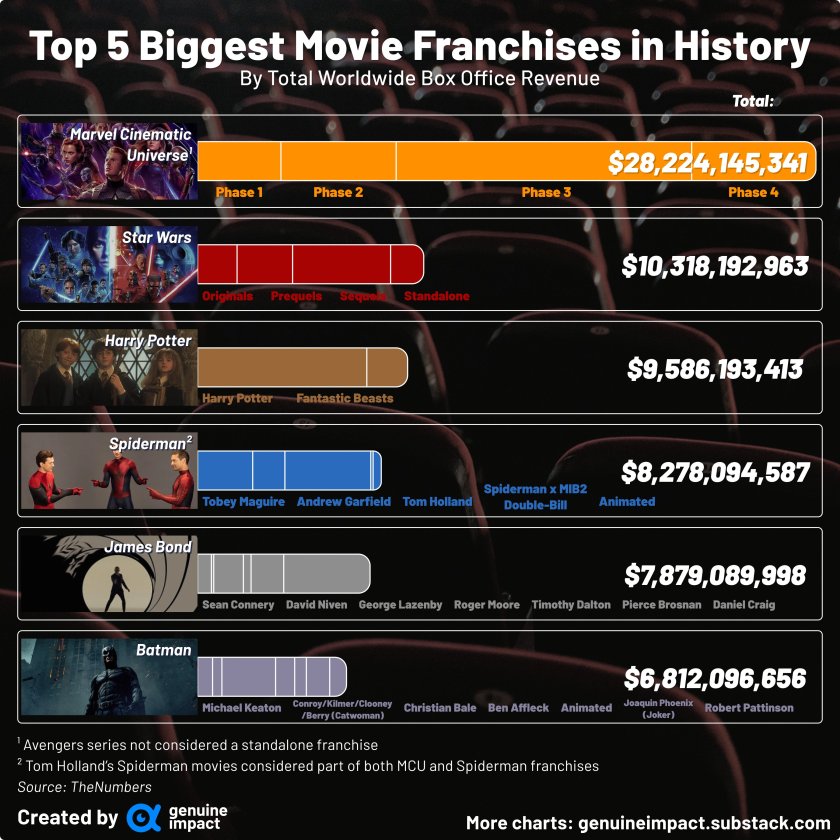Intellectual property associated with character-driven franchise movies like Barbie, Iron Man and The Avengers is being blamed for killing off films about real characters and relationships. Don’t believe it.
The rights to life-saving vaccines, music and leading brands from Apple to Nike are an easy target. Anger towards valuable IP assets is growing. Whether the IP is associated with patents, trademarks or trade secrets, rights that facilitate creativity and attract investment are in the crosshairs; anti-IP memes thrive.
Much of the negativity is a result of ignorance; some of it reflects agenda on the part of tech and other businesses that are threatened by strong IP rights. Whatever the reason, franchise movies, with their seemingly endless series of sequels and prequels, have not escaped the negative IP narrative.
Not Either/Or
Dozens of articles have alluded to the downfall of films at the hands of franchise movies. In fact, it is not an either or scenario, and actors and directors with leverage and audiences who control ticket revenues, have a bigger say in what movies get made and seen than many naysayers realize.
Costly franchise films – e.g. Spider-Man, Iron Man, the Avengers, Indiana Jones, Star Wars, Mission Impossible – don’t de-risk huge investments, but they do make them more viable to already skittish investors. Movies about people and relationships with challenging narratives are still being made but for smaller audiences and on a more limited budget.
Even with the addition of streaming revenues these films often lose money. Getting more challenging films made requires the help of bankable actors and directors, as well as bold investors and efficiency-enabling technology. Effective marketing helps. Engaged audiences must be willing to come out and pay a premium ($25?) to see good but small or independent movies in a theater. Their purchase decisions matter, especially in the U.S., which lacks government support for films outside of local tax breaks.
“Films are still meant to be projected. They look best on the big screen in a theater full of people able to control their urge to talk, eat and text for a full 100 minutes.
The bulk of most all major movies are shot today with actors in front of a green screen, which permits Computer-Generated Imagery (CGI). These game-like images are seductive, especially when presented with the latest technology. They encourage less active viewing. For generations brought up on smart phones and video games these big productions are a go-to choice. Learning to appreciate the stories and acting in smaller films does not come easily for them.

In a recent IPWatchdog, Bruce Berman, looks at the anger directed at “I.P.” and the numerous articles and media generated about franchise films. The frustration is understandable, but at the core is a lack of understanding of the economics of the movie industry, the complexity of intellectual property rights and the nature of audiences. It’s not like art or independent films are unprotected by copyrights and trademarks – they’re simply less marketable today. It does not have to be that way.
Active Viewing
Concludes Berman in his piece, ‘Don’t Blame Barbie and Ken for Killing the Movies – And Don’t Blame IP’:
“Most films are still meant to be projected. They look best on the big screen in a theater full of people able to control their urge to talk, eat and text for a full 100 minutes. Audiences are not used to listening and watching actively.
“There is a place for franchise movies that rely on the latest special effects and a place for those films that reflect peoples’ lives. And there is a history of big movies helping finance smaller, more difficult ones. It’s not an either/or proposition. The movies have always been a strangely democratic medium. Audiences can still call the shots. No amount of IP-based licensing or publicity will change that.
Go here to read ‘Don’t Blame IP’.
Image source: visualcapitalist.com

